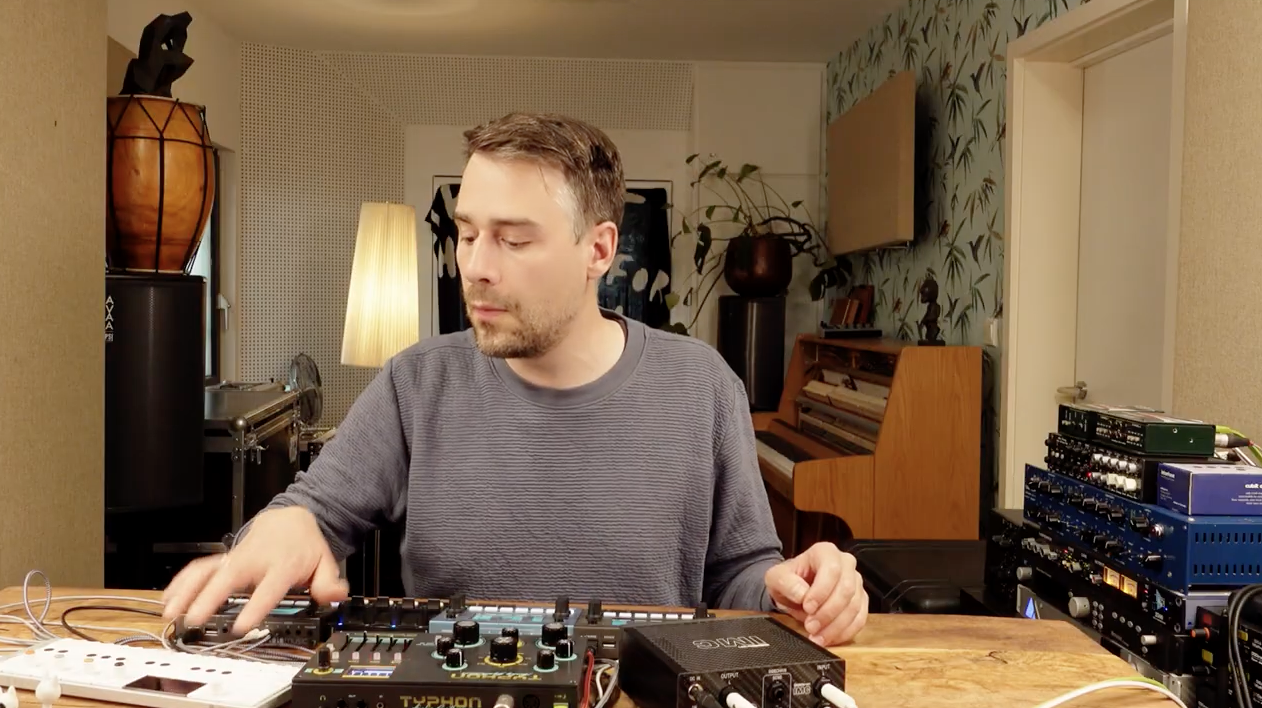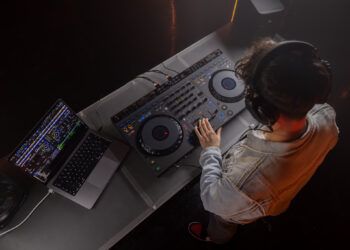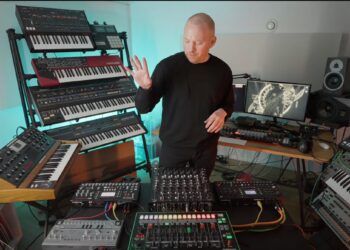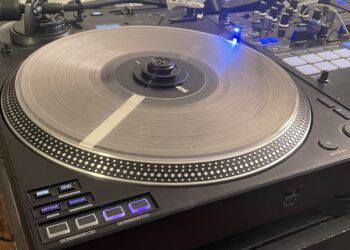We’re back with How I Play two-time veteran and German musician Stimming (check out his original episode, as well as his most recent How I Play featuring his Instant Mastering Chain). This time we’re taking a look at his intricate production process for his newest album Elderberry, released this fall on Awesome Soundwave.
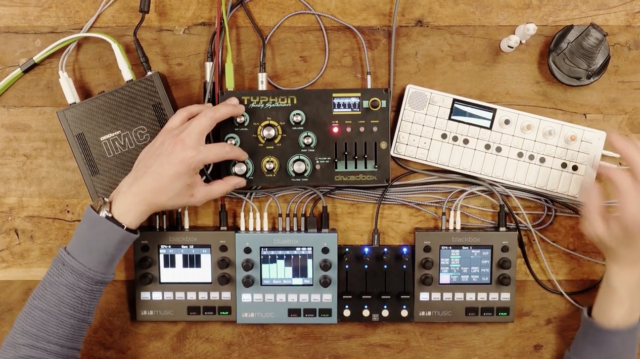
We sat down with Stimming to hear more about how he crafted Elderberry with this overall mindset, as well as dive into the specifics behind the creation of two of the album’s tracks: “The Seeker” and “People Do”.
Scroll on, press play, and enjoy.
Focusing on a hardware-driven production: Making Elderberry
The creation of this 10-track release is a gear-lover’s dream, as he aimed to use as much hardware as possible with minimal computer edits. He explained that he only used software to condense the final arrangements.
When elaborating on these specifics, he shared:
“All of the tracks on the album are based around the Blackbox/Bluebox (+ Intech controller) and DOCtron Instant Mastering Chain (IMC) as a master channel strip-combo. The Blackbox is the mothership in terms of main drums (the one shots that need to be as tight as possible: bassdrum, claps, shakers) and sequencing external gear.
Often I use the IMC to spit out triggers to the Dfam, which is used on a couple of the tracks. A tip for you regarding the Dfam: only use the trigger input externally and let the sequencer play independently – this immediately creates very organic, interesting sounding analog percussion patterns.
The Bluebox works as the performance mixer via the external controller. I used it to record the six inputs simultaneously once I decided a track was ready to be printed as well.
I also recorded the main out of the IMC as the master track. This signal is 90% of what you hear on the album. The IMC made it fun to play around with those hardware boxes, as it glues and pushes everything together very nicely. There will be a 500 series version of the IMC coming soon too, which will be a lot cheaper.
Adding to this, pretty much every reverb on the album is coming from the Specular Tempus pedal (and I’m afraid I always used the same large room, Spatium).
I have to admit, most of the tracks I mixed and performed on in-ears, as I mostly worked at home – and used my studio only for final adjustments.”
“The Seeker”
“The Seeker” is the fifth track on the album, coming in at just under 5 minutes. Take a look at how he uses the Blackbox as well as the Grandmother synth, GR-1 and more:
“For this track I used the Grandmother as the main synth (with the fabulous UAudio Astra behind it, you can see me switch it on and off here and there) and the GR-1 as the riser/FX creator. The GR-1 can be heard on almost every track of the album, as I use it to create a modern texture that works as the glue for the simple and dry groove.
The granular mode inside the Blackbox is also valuable for creating little details and ‘automatic’ variations through it at slow playback speed and low density, but of course only the GR-1 has this ‘hands-on’ control needed for an actual performance. The patch on the Grandmother includes a little FM on OSC2 and the attenuator, and HP Filter is used to add a slight kink in the sound.”
When discussing the track’s arrangement, he continues:
“It starts easy with a running (fully synced, half bar pattern) Dfam. Soon the main melody is introduced, and instead of replaying the original track – which was a performance anyhow – I took care to get to the peak of the instrumental pretty soon. Of course this is something I would slow down into more than five minutes in the club.
Unfortunately I cannot bring all the surrounding gear for each track in a club live set, so I need to use the stems that I recorded. It is suboptimal I admit, and for my next techno album, I will try to use a setup that itself is possible to bring and construct the tracks much more for being replayed originally.”
“People Do“
“People Do” is, as he labels it, the single house genre track on the album. It’s also his track of choice to play as the opener for his live sets currently, as he finds it “works as a great ice breaker.” As he puts it: “I love this track’s simplicity, as I find it to be simultaneously very effective.”
When asked to elaborate on his gear setup and process to build “People Do”, Stimming explains:
“‘The track uses a string stab from my track “Change”, which I made together with Lazarusman many years ago. This one stab plays a totally new melody, which makes it totally different to the ‘original‘.
If you can catch a glimpse on the main page of the Blackbox, you will recognize that there’s only four sounds used: the bassdrum, the stab twice, and one pad called C3. The C3 is used for a MIDI out into the OCS-2, a function that nowadays doesn’t need a special pad as they moved the MIDI functionality into the seq area.
I also have a another Intech midi controller attached, which is routed to the filter of the stab. The drop’s ability to be so powerful at second 20 is a quality of the IMC, that takes care to reliably punch everything to the front without flattening or destroying it.
The GR-1 is with us in this track again, having the same function as in ‘The Seeker’ – using it as a ‘riser’ -. The generator is highly dependent on the source material. Finding the right WAV files for that – primarily self-recorded ones – was one of the main challenges for each track.
The OCS-2 plays the single acid tone. This synth is a strange rarity from France, but it opened my eye to the ‘acid basslines’.
The percussions come from the Model:samples, with the ‘Control All’ function heavily used (function + parameter changes it on every of the six voices), and the reload pattern for quickly getting back to the original pattern. One of the performance tricks I liked to do – and still do on every Elektron drum-machine – is changing all samples to Loop via the function plus loop button and then reduce function+Sample Stop. This gives a crazy uprising stutter effect, that needs to be reset in the right time (at the drop?! where’s the drop?! – the digitakt does this on function + no).”
Catch up with Stimming on-tour
With the release and current live tour through the end of January for Elderberry, you can watch Stimming perform slightly altered hardware-based performances of these tracks since he can’t take his entire studio with him on the road. He noted that this won’t always be the case, though:
“Unfortunately I cannot bring all the surrounding gear for each track in a club live set, so I need to use the stems that I recorded. It is suboptimal I admit, and for my next techno album, I will try to use a setup that itself is possible to bring and construct the tracks much more for being replayed originally.”
As always, we look forward to seeing what’s next from Stimming, as well as watching how his productions and live club performances iterate and expand for years to come.
Stimming’s album Elderberry is up for grabs on Beatport and Bandcamp now.


